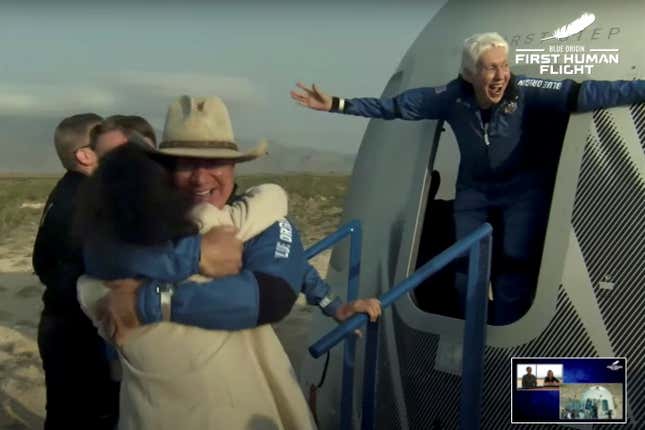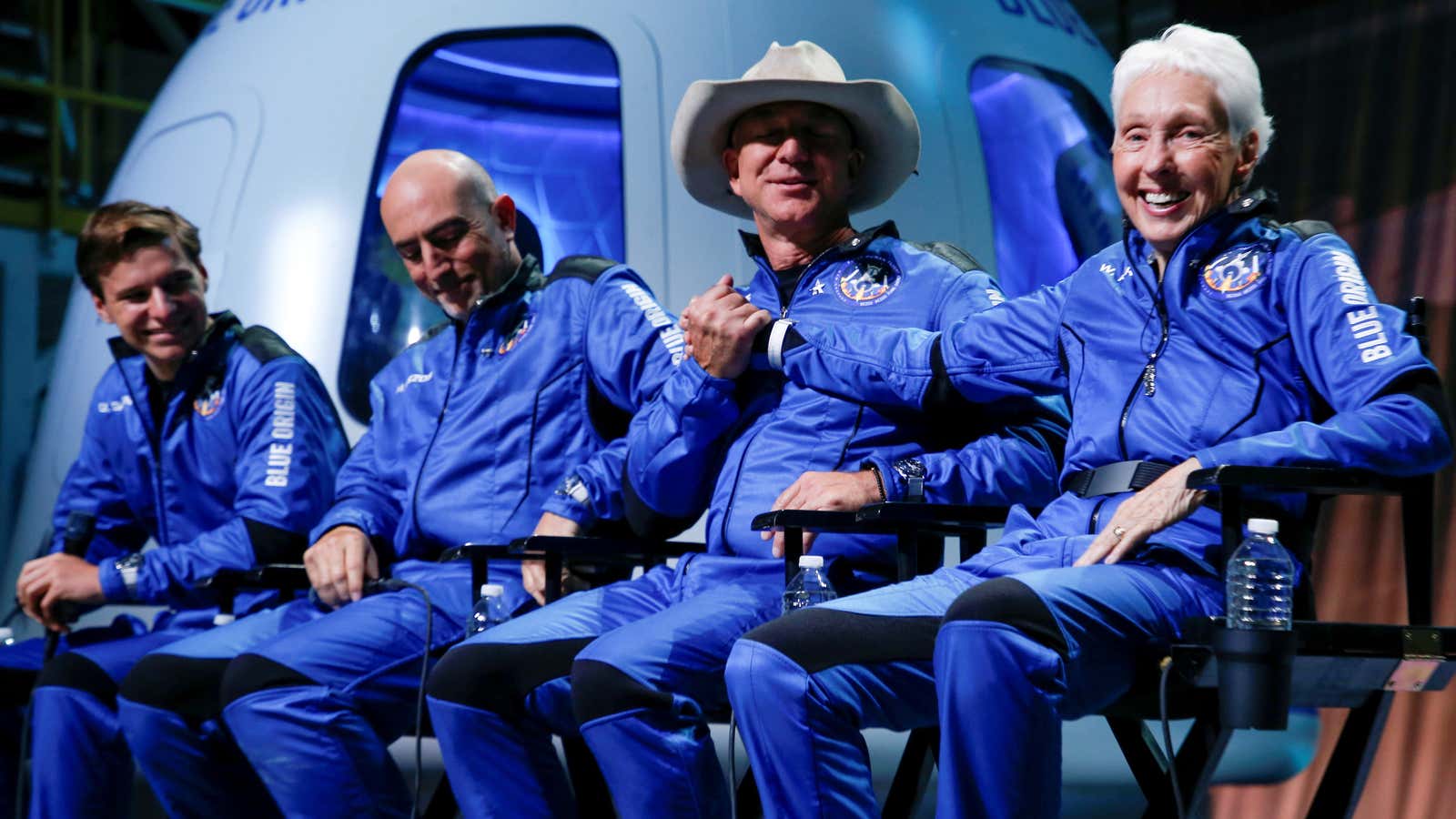The backlash to the billionaire space race is burning as brightly as Jeff Bezos’ rocket, since the New Shepard blasted off into the heavens on June 20. Critics are arguing that the world’s richest man is indulging his ego rather than using his wealth and resources to solve pressing problems here on Earth, while Bezos says he is trying to solve Earth’s problems: Among his ideas for addressing climate change is sending high-polluting industries into outer space.
Whatever your opinions of Bezos and his space enterprise, Blue Origin, there is one element of the company’s first crewed space flight that’s hard not to celebrate: this takeoff was the culmination of Wally Funk’s professional dreams, some 60 years in the making.
How Wally Funk trained to be an astronaut
The 82-year-old Funk was invited by Jeff Bezos to join him as one of four people aboard Blue Origin’s first passenger space flight. Funk, a pilot who’s spent more than 19,500 hours in the air, had been trying to go to space since the 1960s, when she asked to participate in the Women in Space program—a privately funded project that aimed to find out how women fared on the physical and psychological tests to which NASA’s male astronauts had been subjected.
As part of the program, Funk spent a record 10 hours and 35 minutes floating peacefully in a sensory deprivation tank (“I turned my brain off and I went up into the heavens,” she recalled to the Guardian). She had ice water injected into her ears to induce vertigo, and swallowed a three-foot-long rubber tube. “Higher, faster, longer—that is my motto,” she told the Guardian of her persistence in the face of such trials. “I can go out there and do anything.”
Of the 19 women enrolled in the program, Funk was one of 13 to pass the tests. “They told me that I had done better and completed the work faster than any of the guys,” Funk said in an Instagram video posted by Bezos on July 1. Unfortunately, the program was canceled as NASA got nervous about the prospect of sending women into space.
NASA eventually began accepting women astronauts in the late 1970s. But Funk lacked the engineering degree the space agency required at the time. “Four times I said, ‘I want to become an astronaut,’ but nobody would take me,” Funk said in the Instagram video. (She also says she actually tried to get an engineering degree, but was rebuffed on account of her gender.) Sexist norms also led her to hit a wall in her efforts to become a commercial airline pilot.
Wally Funk’s exceptional aviator career
Funk had a remarkable career regardless, becoming the first woman to serve as a safety inspector in the Federal Aviation Administration and as an air safety investigator for the National Transportation Safety Board. She’s taught more than 3,000 people how to fly. And as soon as commercial space travel became a possibility, she was right on top of it, reserving a $200,000 ticket aboard Virgin Galactic, Richard Branson’s rival space tourism company, back in 2010. (Virgin Galactic ultimately made its debut journey this month without Funk aboard, but Funk’s agent says she’s still planning to go on that ride, too.)
Back in 2019, with Virgin Galactic suffering from delays and no inkling of Bezos’ eventual invitation, an unflappable Funk said that she was confident she’d make it to space sooner or later. “I don’t worry about anything, honey,” she told the Guardian, adding, “I will get up there somehow.”
What we can learn from Wally Funk
Inviting Funk along was a savvy PR move on the part of Bezos and Blue Origin. Still, it was moving to witness Funk’s elation as she emerged from the rocket capsule after her trip to the edge of space, wearing an open-mouthed smile, her arms spread wide. She was back on the ground, but she looked as if she contained enough joy to take flight again all by herself.

That’s not to paint an overly rosy picture of the arc of Funk’s career. The gendered barriers she faced in her attempts to become an astronaut were entirely unfair. And going to space this way wasn’t exactly as Funk had imagined it, nor was it a replica of what she would have experienced had she had the opportunity to join NASA.
“I thought I was going to see the world but we weren’t quite high enough,” she said at a press conference Tuesday, referring to her view of the Earth from the edge of space. Though overwhelmingly positive and upbeat, she also noted the brevity of the 10-minute flight, and that she didn’t have quite as much freedom of movement as she might have wished once zero gravity kicked in.
“I just wish it had been longer…and [that I] could do a lot more rolls and twists and so forth,” she said. “But I loved it. I can hardly wait to go again.”
Career twists and turns we can’t plan for
Most people don’t have the money, cultural import, or even the desire to snag a ticket aboard a commercial space flight. Funk’s honesty about her trip to space—both her jubilance and her inevitable thoughts about how it might have been different—only make her story more relatable. It’s also a reminder of the surprising turns our careers can take.
We may fulfill our goal of publishing a book decades later than we thought we would, or never land a job at the prestigious institution we once fixated upon—only to find real satisfaction working at a smaller, more obscure, but no less worthy organization.
It’s okay to feel disappointment about what might have been. But it’s also important to revel in what we do achieve, as Funk does, and to remember there’s often a way to achieve our goals. The path just might not unfold quite as we planned.
